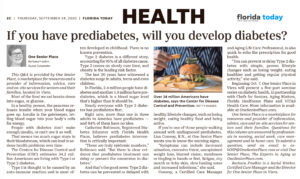
Barbara Fradkin, One Senior Place – Special to FLORIDA TODAY
This Q&A is provided by One Senior Place, a marketplace for resources and a provider of information, advice, care and on-site services for seniors and their families, located in Viera.
Do you have a question for The Experts in Aging? Email us at AskOSP@OneSeniorPlace.com
Q: If you have prediabetes, does that mean you will develop diabetes?
 A: Most of the food we eat breaks down into sugar, or glucose.
A: Most of the food we eat breaks down into sugar, or glucose.
In a healthy person, the pancreas releases insulin when your blood sugar goes up. Insulin is the gatekeeper, letting blood sugar into your body’s cells for energy.
People with diabetes don’t make enough insulin, or can’t use it as well.
That means too much sugar stays in their bloodstream, which can lead to serious health problems over time.
The Centers for Disease Control and Prevention (CDC) estimates 34.2 million Americans are living with Type 1 or Type 2 diabetes.
Type 1 is thought to be caused by an auto-immune reaction and is most often developed in childhood. There is no known prevention.
Type 2 diabetes is a different story, accounting for 95% of all diabetes cases. Type 2 comes on slowly over time, and obesity is the leading risk factor.
The last 20 years have witnessed a diabetes surge in adults, teens and even children.
In Florida, 2.4 million people have diabetes and another 5.8 million have prediabetes, which is a blood sugar level that’s higher than it should be.
Nearly everyone with Type 2 diabetes has prediabetes first.
Right now, more than one in three adults in America have prediabetes — and 84% of them have no idea.
Catherine Robinson, Registered Diabetes Educator with Florida Health Plans, believes prediabetes intervention is critically important.
“These are truly epidemic numbers,” Robinson said. “But there is clear evidence that prediabetes treatment can delay or prevent the conversion to diabetes.”
And that’s the good news: Type 2 diabetes can be prevented or delayed with healthy lifestyle changes, such as losing weight, eating healthy food and being active.
If you’re one of those people walking around with undiagnosed prediabetes, Lisa Conway, R.N., at One Senior Place wants you to know the warning signs.
“Symptoms can include increased urination, excessive thirst, unexplained weight loss, blurred vision, numbness or tingling in hands or feet, fatigue, dry mouth or itchy skin, slow healing sores and increased infections,” she said.
Conway, a Certified Care Manager and Aging Life Care Professional, is also quick to echo the prescription for good health.
“You can prevent or delay Type 2 diabetes with simple, proven lifestyle changes such as losing weight, eating healthier and getting regular physical activity,” she said.
Beginning Oct. 7, One Senior Place in Viera will present a five-part seminar series on diabetic health, in partnership with Chefs for Seniors, Aging Matters, Florida Healthcare Plans and VITAS Health Care. More information is available at OneSeniorPlace.com.
# # #
One Senior Place is a marketplace for resources and a provider of information, advice, care and on-site services for seniors and their families. Questions for this column are answered by professionals in nursing, social work, care management and in-home care. To submit a question, send an email to askOSP@OneSeniorPlace.com or visit One Senior Place, The Experts in Aging at OneSeniorPlace.com.
Barbara Fradkin is the Director and a Social Worker at One Senior Place in Viera.


